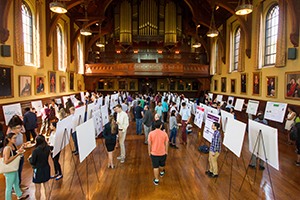PROVIDENCE, R.I. [Brown University] — When French and English concentrator Antonia Shann first arrived at Brown from her native United Kingdom, she knew a Ph.D. might be on her horizon. And in applying for an Undergraduate Teaching and Research Award (UTRA) this summer, she suspected that the intensive research experience would help her figure out if academia was a good fit.
Shann was right. The project — co-creating a new course on refugee experiences with French studies professor Virginia Krause — gave her a feel for what she would be in for. To curate the reading list that would form the core of the course, Shann spent countless hours combing through books, films, scholarly articles, news articles, podcasts and websites on a quest to find material that would give students an in-depth historical, political and personal understanding of what it means to be a refugee. The research was as challenging and rewarding as she hoped, but Shann says the experience ultimately opened up another potential career path: using her French skills to advocate for refugees and immigrants.
“The crisis of immigrants and refugees at this moment is a humanitarian issue, and it’s definitely important and valuable to engage with it on an intellectual level,” Shann said. “But if you have academic knowledge and qualifications, then you also have a responsibility to use them to help other people.”
While the majority of summer UTRA projects at Brown focus on independent research, a handful enable students to aid a professor in developing a new course or revamping an old one. Krause enlisted Shann’s assistance for a new fall course, L'expérience des Réfugiés/Immigrés — The Experience of Refugees and Immigrants — because the subject matter strayed beyond her research focus on the literature and culture of Renaissance-era France. Krause says she needed a smart, nuanced student like Shann to be her “interlocutor” — a partner in inquiry who would help her find the right mix of material for the course.
The class will use literature, film, the press and critical essays to explore exile, hospitality, diaspora and asylum by focusing on the experience of Francophone refugees from the 1950s to the present, with an emphasis on the current refugee crisis in Europe. The objectives, Krause says, are, on one hand, historical — providing context for modern notions of asylum and migration — and on the other, ethical, asking students to consider what is at stake in the confrontation between “us” and “refugees.”
Rather than just study these ideas in the classroom, however, students will engage directly with the refugee community, volunteering each week at Women’s Refugee Care, a Providence nonprofit that supports families from the French-speaking African countries of Burundi, Rwanda and the Democratic Republic of the Congo. In addition to the hours spent reading and researching, Shann helped Krause connect with Women’s Refugee Care, meeting with director Aline Binyungu to explore how students could best support the nonprofit’s mission and work.
Along the way, Shann learned more about French culture and politics as they relate to refugees and immigrants, she says. But more broadly, she gained a nuanced understanding of what it means to be uprooted and alienated from a home — and the issues around identity and belonging that this surfaces. Meeting and speaking with Binyungu, a former refugee from the Democratic Republic of the Congo, and learning more about the needs and experiences of Providence’s refugee community, drove these concepts home.
Shann says the community engagement component of the course will be essential to a deeper insight into its subject matter, as it was for her. And whether she ends up in the academy or advocating for refugees across the globe after graduation, Shann says the summer taught her an important lesson on how personal connection can enhance and elevate intellectual inquiry.
“Even if you’ve read a lot about what defines a refugee, even if that includes personal stories, there’s still one step of remove between you and a text than between you and an actual person,” she said. “There’s a difference between engaging academically and intellectually with a subject and having a more visceral connection with a person.”
